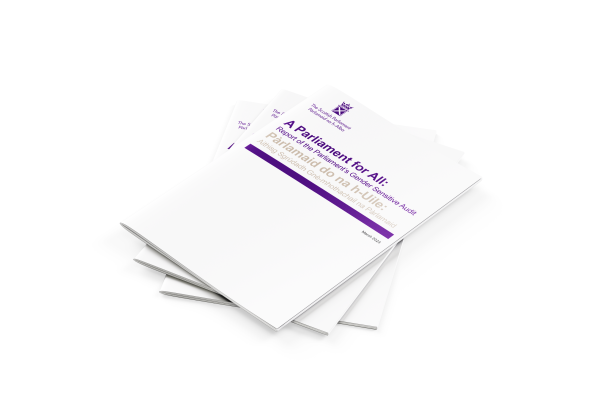by Professor Sarah Childs, Dr Meryl Kenny and Professor Fiona Mackay
Almost a year ago, the Scottish Parliament’s Presiding Officer, the Rt Hon Alison Johnstone MSP, invited the three of us to join the board of a new review of the representation and participation of women at Holyrood. As gender and politics academics, we are committed to both studying and transforming political institutions in ways that make them work better for women. We very much welcomed the opportunity to bring our academic expertise to wider discussions around parliamentary representation and reform. Twelve months later, the publication of A Parliament for All marks an important moment, with Scotland building on its record to-date and joining a growing number of countries around the world committing to reforms that will gender sensitise its parliament.
The concept of a gender-sensitive parliament (GSP) is more than two decades old, and represents an international democratic standard. Efforts to gender sensitise parliaments have been supported by international and regional organisations, including the Commonwealth Parliamentary Association, Inter-Parliamentary Union (IPU), the Organization for Security and Co-operation in Europe, the European Institute for Gender Equality, and UN Women. Most recently, at the 145th IPU Assembly, 120 parliaments agreed the Kigali Declaration, reaffirming their commitment to gender sensitivity, and the importance of gender equality and gender-sensitive parliaments as ‘drivers of change for a more resilient and peaceful world.’ A GSP is one that values and prioritises gender equality as a social, economic and political objective, and reorients and transforms a parliament’s institutional culture, processes and practices, and outputs towards these objectives [1]. In so doing, a GSP approach goes beyond numbers to examine whether women - and which women - have access to political power, and the extent to which parliamentary infrastructure, rules and culture support greater gender equality.
The publication of the report is particularly timely in the run-up to the parliament’s 25th anniversary in 2024. There is much that Scotland can be proud of, as the Presiding Officer makes clear in her statement accompanying the report. Some of our own research – individual and collaborative over many decades, including with colleagues like Alice Brown and Esther Breitenbach – documents many of the achievements of the parliament to date: historically high levels of women’s representation; the embedding of gender equality into parliamentary blueprints, including a commitment to family-friendliness; and notable policy outcomes, for example, with regards to domestic abuse policy [2]. But, as Dr. Fiona McKay’s audit highlights, there have been fluctuations over time in women’s participation and representation; intersectional disparities persist; and the mainstreaming of equalities is too often ad hoc, rather than institutionalised.
A Parliament for All outlines 34 wide-reaching recommendations that target participation, representation, parliamentary culture, and gender equality mainstreaming. Crucially, each recommendation is linked to specific individuals, groups or bodies, identifying who is responsible and accountable for implementation. Reform efforts need to be across all of these inter-dependent dimensions. To ensure a holistic and systematic approach to implementation, we particularly welcome the first, and overarching, recommendation to create and resource a Scottish Parliament Gender Sensitive Parliament Advisory Group composed of MSPs from across the parties. Reflecting international best practice, the Advisory Group institutionalises the ongoing ownership of the GSP agenda throughout parliament, and will ensure there is continuous review, revision and improvement of this work over the short-, medium- and long-term.
Why does it matter? As the report states, parliaments are unique institutions that are both places of democracy and places of work. To deliver the best outcomes for both under-represented groups and for the public as a whole, women must be fairly represented, be able to fully participate in parliament, and be centrally involved in decision making; and equalities must be embedded throughout. Parliaments are – and should be – role-model institutions. A parliament that in its make-up reflects the wider society is ‘truly representative, transparent, accessible, accountable and effective in all its functions.’
Why should academics engage with this kind of work? As academics concerned with gender inequalities, we embrace engaged scholarship, working with political institutions and practitioners, as well as civil society and the public. Academics should be able to translate their research to practical settings; similarly, we can only benefit from working in partnership with those beyond the University. The work has been hugely rewarding but also, at times, intensive, and points to the need for universities to think seriously and strategically about how to support the ‘impactful academic.’
We very much look forward to seeing the implementation of A Parliament for All. Together, these recommendations promise an inclusive Scottish Parliament for the next twenty-five years and beyond; one that in its work, procedures and institutional culture is representative and effective.
Sarah Childs is Professor of Politics and Gender at the University of Edinburgh and author of The Good Parliament Report.
Meryl Kenny is Senior Lecturer in Gender and Politics at the University of Edinburgh and Co-Director of the Centre on Constitutional Change.
Fiona Mackay is Professor of Politics at the University of Edinburgh and founding Director of GENDER.ED.
Footnotes:
[1] Childs, S. and S. Palmieri (2023) ‘Gender Sensitive Parliaments: Feminizing Formal Political Institutions’ in Sawer, M., Banaszak, L.A., True, J. and J. Kantola (eds) Handbook of Feminist Governance. Cheltenham: Edward Elgar.
[2] See for example, Kenny, M. and F. Mackay (2020) ‘Women, Gender and Scottish Politics’ in M. Keating (ed) The Oxford Handbook of Scottish Politics. Oxford: Oxford University press.

